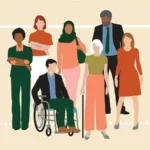Written by Hawun Ratuharati
Edited by Francis Urciullo
Today 31st of March is the date we get to celebrate the Transgender Day of Visibility. In light of the many transphobic laws, policies, and discourses, such as the recent state bill “Don’t Say Gay” (Florida, U.S), which prohibits “classroom discussion about sexual orientation or gender identity”, the harmful propaganda of British novelist J.K. Rowling, Poland and Hungary’s increasing actions against trans identities, it is of the utmost importance that the transgender community is celebrated on such a special and symbolic day.
The Transgender Day of Visibility is an annual date dedicated to the celebration of transgender people and raising awareness of the discrimination faced by transgender people and of the work needed to achieve trans justice worldwide as well as a celebration of their accomplishments. Rachel Crandall founded the day in 2009 as a reaction to the lack of LGBT recognition and celebration of living transgender people. In fact, the only well-known transgender-centered day was the Transgender Day of Remembrance, aimed at mourning the lives of those who have been murdered due to transphobia.
LGBTQIA+ Resources and Facilities: Where to Find Them?
As an addition to the podcast episode we had on “Dealing with a Gender Identity Crisis as a Student” (listen to the episode here) with our special guest Hawun, below we compiled a list of resources and facilities where LGBTQIA+ students can go to for safety, and mental and physical support in Groningen and at the University of Groningen (RUG).
The RUG
Study Advisor: They’re usually the first persons suggested for help and the main mediator between the faculty and the higher tier. They’re meant to help with practicalities related to your study, such as how many courses you should take per block, arranging for examination appeal, choosing courses that you can pass, and eventually collecting ECTS according to your particular situation.
Student Service Center (SSC): your study advisor can refer you here. They help arrange things related to study delay, especially if it’s related to your residence permit and they also accept reports of inappropriate or discriminatory behavior within the university grounds.
In the Faculty of Behavioural and Social Sciences (BSS), there is a newly launched LGBTQ expert centre and I-BSS, which is an initiative for inclusion in the BSS faculty.
In Groningen (outside the RUG)
Transvisie.nl: compiles trans and non-binary related information including resources of transgender-friendly general practitioners. You can install the google translate plugin on your browser, they will automatically translate the page into English.
AllEars is an organization for students that offers a confidential, listening ear.
If your days are getting very difficult, social worker organizations in Groningen like Humanitas or Ixta Noa have volunteers that may help you in your daily life.
A good self-care website to check out is youfeellikeshit.com. It lays out the steps to self-care from a practical perspective.
The Dutch suicide hotline number is 0800-0113 and they speak English. Remember that you are a worthy human being and sometimes family is more than just blood relations.
On a friendly suggestion, the waitlist for transgender medical care (as in access to gender-affirming care like hormones, surgery, and psychological consultation associated with it, access to ‘experts declaration’ to be able to make legal changes like your name and gender marker in your documents) in The Netherlands is long. Therefore, it’s important to build a support circle and (try) to cultivate habits that benefit you more than it harms you in the long run. If you have access to therapy, attend it.
LGBTQIA+ Glossary
Below we listed an essential checklist of LGBTQIA+ terms associated with gender and their respective pronouns.
LGBTQIA+: Lesbian, Gay, Bisexual, Transgender, Queer or Questioning, Intersex, Asexual and Aromantic with + referring to “in recognition of all non-straight, non-cisgender identities”. More about the term here and a resource for allies here.
CISGENDER (CIS): it is a person whose gender identity is aligned with the sex they were assigned at birth.
SEX: a set of biological attributes in animals, including humans. Sex is primarily associated with physical (the body itself) and physiological (the body’s features) components including gene expression, chromosomes, hormone function, and levels as well as sexual/reproductive anatomy. Usually categorized as female or male. The current system entails that if you were female, your gender is a woman, and if you were male, your gender is a man. Sex is not the same as Gender.
GENDER: a social construct that includes behaviors, roles, identities, and expressions of girls, women, boys, men, and people outside of these categories. Gender influences one’s perception of themselves and other people, how they interact and act, and the power distribution and resources in society. Gender identity is neither binary (girl/woman, boy/man) nor static; it exists along a continuum and can change over time. Gender is not the same as Sex.
TRANSGENDER: an adjective (“a transgender person” in usage) that describes people whose gender identity differs from the sex they were assigned at birth. It is also an umbrella term for the ones below
- Non-binary: an adjective (“a nonbinary person” in usage) that describes people whose gender expression or/and identity falls outside the binary gender categories of “man” and “woman”. Some non-binary people consider themselves transgender, some do not.
- Gender Non-conforming: usually abbreviated as “GNC”, it is the term used to describe people whose gender expression differs from the conventional expectations of masculinity and/or femininity. Having a GNC gender expression does not make someone non-cis.
- Genderqueer: usually used interchangeably with non-binary. There is a similarity with the meaning of non-binary, but it is slightly different. Genderqueer is the term denoting or relating to a person who does not comply with conventional gender distinctions but identifies with a combination of male and female genders, both, neither, or other genders.
TNG: Transgender, Non-binary, and Gender Non-Conforming. Sometimes referred to as non-cis. More on trans terms here.
AGAB: Assigned Gender At Birth. When someone is born, they are usually marked as a certain gender according to their sex. When a baby has a penis, they are usually assigned male at birth (also called AMAB), when a baby has a vulva, they are usually assigned female at birth (also called AFAB). Intersex babies will usually be subjected to unnecessary medical intervention on their genitals so that they can be put into the binary box of AFAB or AMAB.
Pronouns
Arguably, the “hottest” topic in the gender-discussion/discourse. When it comes to pronouns, it all really depends on a subjective level. Some TNG people consider it exhausting to assert themselves and correct people constantly on the (mis)-use of their pronouns. It costs a lot of energy they do not necessarily want to invest in. Some binary trans people put a lot of effort into passing for their gender and consequently want others to assume their pronouns (i.e. he/him for trans men, and she/her for trans women). In this case, asking for their pronouns can make them feel like they have failed to do so. Other TNG people believe it is better to use they/them pronouns for everyone and let them tell you their pronouns instead of directly asking for them. Some others believe in an open and direct approach as in asking directly which pronouns the person they are interacting with use, in order to avoid assumptions as external appearance can be misleading. This can also work in the same way as a TNG person introducing themselves along with their pronouns.
Some people wonder whether the use of they/them pronouns is grammatically incorrect (some others also stubbornly believe so). However, the use of they/ them pronouns in English is grammatically correct. In fact, there is evidence that these pronouns have been used to refer to a third-person singular since the 14th century. Grammatically speaking, they/them pronouns are generally used to refer to a person of whom you do not know the gender. In the LGBTQIA+ context, it translates to referring to a person who does not identify either as she or as he.
It is important for TNG students to have a voice and be involved in determining the diversity and inclusion culture and policies of the University they belong to, and for the Institution to facilitate this.
As for cis allyship, don’t let the ‘no correct way to approach’ discourage you from trying at all. Because the most important thing is that caring about this matter and making an effort to use the right pronouns when corrected is something everyone can do. Everyone has pronouns, not just TNG people.
How Can You Provide Support to the Transgender Community?
Acknowledge that TNG students face several challenges, especially when this identity intersects with others such as their ethnicity, their disability, etc.
Understanding that the life experience of TNG people is not always synonymous with suffering and misery. Instead, it is a synonym for resilience. Most importantly, the TNG life experience is an innate celebration of self-discovery and self-actualization.
Remember that the TNG Community is still a minority group, which faces discrimination and dehumanization from hostile others.
Reflect on current society’s culture and how it disadvantages TNG people and what you can do to change it.
Reflect on the higher education policies and culture and how it disadvantages TNG people; learn what can be done.
Be aware of real-life obstacles TNG people face (such as how FvD recently uses “how many genders do you have today?” as a political campaign and subsequently feeds more fire to the frequent violence against TNG people).
Some TNG people may be open about talking about their pre-coming out life, including their birth name, their AGAB, and details about their pre-coming out life, but be aware that this is usually not the case for a lot of TNG people. In general, it is extremely in bad taste to ask about a TNG person their AGAB, how their genital configuration is, and their birth name unless the person gave their consent to share that information first. This is not a question you’d randomly ask a cis person and you’d consider it inappropriate, so why would asking this to a non-cis person be any different?
Bibliography
- General trans day of visibility: https://www.glsen.org/activity/transgender-day-visibility#:~:text=March%2031%20is%20the%20International%20Transgender%20Day%20of%20Visibility.&text=The%20day%20is%20dedicated%20to,done%20to%20achieve%20trans%20justice.
- “Teaching beyond the gender binary in the university classroom” https://cft.vanderbilt.edu/guides-sub-pages/teaching-beyond-the-gender-binary-in-the-university-classroom/
- “How to create a welcoming environment for non-binary students”
https://create.piktochart.com/output/38939812-non-binary-students - Make space and listen to trans and nonbinary students. This APA.org recorded (1hr) webinar is a very interesting look into the lives of graduate (mostly) nonbinary students and their specific obstacles. The same group also made the infographic above. https://register.gotowebinar.com/recording/viewRecording/5435226123245411075/2275216511764203011/[email protected]?registrantKey=6707494117973903373&type=ATTENDEEEMAILRECORDINGLINK
- “Ways to put Trans advocacy into action”
https://www.campuspride.org/resources/23-ways-to-put-trans-advocacy-into-action/ - “Six ways teachers can support their trans students”
https://www.glaad.org/amp/revamp-supporting-your-trans-students - “Supporting transgender and gender diverse students in school; a guide for school staff” by American Psychological Association.
https://www.apa.org/pi/lgbt/programs/safe-supportive/lgbt/school-administrators.pdf - “Supporting transgender and non-binary students and staff in further and higher education : practical advice for colleges and universities (Lawrence & McKendry, 2019). https://drive.google.com/file/d/19TNXkrMnfst751GdHMQy5rMTo_Ei7S9i/view?usp=sharing
- [Dutch] “Hoe gebruik je genderneutrale voornaamwoorden in het Nederlands? Een praktische uitleg met voorbeelden en tips” (How do you use gender neutral pronouns in Dutch? A practical explanation with examples and tips) https://www.transgenderinfo.nl/wp/wp-content/uploads/2020/10/genderneutrale-voornaamwoorden-in-het-nederlands.pdf
- “How do I use your pronouns correctly?” https://www.mypronouns.org/how
- Essay on the importance of mentorship for LGBTQ+ undergraduate students https://drive.google.com/file/d/19Ddut9bqCYQ6JxCYOTIhnyh3C4cirqys/view?usp=sharing
- Essay about qualitative study on queer teens and adolescents identity: https://drive.google.com/file/d/1yyt72P_AhWChtkvtG4TXHAWxD8OoZdzL/view?usp=sharing
- Essay about minority stress on nonbinary and gender nonconforming students in higher education, they linked most of the resources I mentioned from 1-6:
https://drive.google.com/file/d/166BPNF0w_dDDASyoesohsOBgzyPBdTZb/view?usp=sharing - Essay about a qualitative study on LGBTQ+ students and staff microclimates in campus and its suggested interventions.https://drive.google.com/file/d/19LDZ16rusrzBU1EI3BEnsW6Zpsv9AWx2/view?usp=sharing.
- “To create climates that are affirming to all LGBT campus community members, higher education practitioners must address both organizational-level and microclimate issues related to heterosexism, homophobia, genderism, and transphobia.”
- Detailed chapter on account of queer student experiences; ASHE Higher education report: Stonewall’s Legacy, LGBTQ+ students in higher education (Marine, 2011) https://drive.google.com/file/d/1FbIFZ7jSLdTNcnEnP3iMIku70C1w9sUA/view?usp=sharing
- Essay or chronic misgendering being very prevalent in higher education that sometimes leads to drop outs, misgendering rates being much higher in the faculty of natural sciences
https://drive.google.com/file/d/1TFCkylXDqI_1rlcmWDhKM9Z-yyIbUtlm/view?usp=sharing - “Experiencing misgendered pronouns as a classroom empathy exercise” https://drive.google.com/file/d/19MM_9fLdAZOLNpBZGePg9Hy4xKFDx3Ii/view?usp=sharing. An essay that details “a gender pronoun reversal activity that simulates the experience of being verbally misgendered”. Students followed up on the activity by posting reflections on an online class discussion board. The activity promoted empathy among cisgender students for transgender people and reflexivity regarding the social boundaries of gender identity.
- “Faculty perceptions of chosen name policies and non-binary pronouns” https://drive.google.com/file/d/19N6t0ynHxPHFryO-ZIJBb8hzOuQ85C-b/view?usp=sharing. Qualitative study on university faculty’s attitude to non-binary students name change and pronouns, concluding that “policy implementation and educational opportunities should seek to do more than assimilate the identities and experiences of transgender people into existing institutional structures and practices. They should seek to examine, question, and re-shape those structures and practices. Such approaches would teach faculty to conceptualize ‘gender’ more expansively: to expect gender diversity and fluidity, and to adopt language and practices reflecting those expectations. Faculty embodying such perspectives would view the work of learning to use non-binary pronouns not as excessive effort on behalf of ‘entitled’ students, but as extra effort required to respect valid identities. What’s more, these faculty would extend their conception of gender to all of their work with students. They would avoid phrases such as ‘both genders’, ‘ladies and gentlemen, and ‘Mr./Ms.’ They would design procedures anticipating the needs of transgender students as they move into off-campus opportunities (student teaching, internships). Such approaches will transform college campuses into more gender-inclusive spaces and prepare all students for a workforce and a world in which they expect gender diversity as a given.”
*All links are acquired through google, smartcat, and libguides with the latter 2 with Rijksuniversiteit Groningen UB proxy.



